Initial meeting
Informal meeting of UK public and private sector ombudsman took place in London to discuss common ground.
First conference
First joint conference of UK ombudsman from both the public and private sectors held in Meriden, England, at which it was agreed to set up an association for ombudsman, their staff, and other organisations and individuals, such as voluntary bodies and academics interested in the work of ombudsman offices.
Association created
The Association came into being as the United Kingdom Ombudsman Association, with Gordan Adams as the Secretary. The Association had 13 founder members and the original criteria for recognition were: independence; fairness; effectiveness; and accountability.
First Executive Committee meeting
The very first meeting of the newly-established Executive Committee of the UK Ombudsman Association (UKOA) was held on 13 May 1993 in the then offices in Fetter lane, London, of the Banking Ombudsman (subsequently subsumed into the Financial Ombudsman Service). Present were:
- Laurence Shurman, UKOA Chairman and Banking Ombudsman
- Dr Julian Farrand, Insurance Ombudsman
- Bob Peggie, Scottish Local Government Ombudsman
- Sir William Reid, Parliamentary and Health Service Ombudsman
- Gordon Adams, UKOA Secretary.
First ‘Interest Group’
First meetings of the Managers’ Group take place to discuss matters of mutual interest for those managing ombudsman schemes.
'British and Irish Ombudsman Association'
The Association changed its name to the British and Irish Ombudsman Association (BIOA) when membership was extended to include ombudsman offices from the Republic of Ireland.
First issue of The Ombudsman
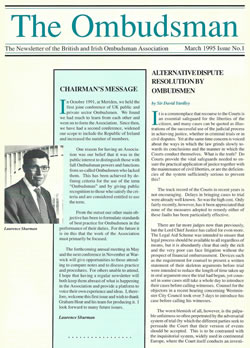 The first issue of the Association newsletter, The Ombudsman, is published.
The first issue of the Association newsletter, The Ombudsman, is published.
'…while the public might see the Ombudsman movement as a single mass, rather like the Courts systems, it is arguable whether there is a corresponding feeling of unity among the staff of the increasingly numerous offices which make up the membership of the BIOA. Avoiding, I hope, too many clichés, one of the main aims of this newsletter is to try to spread the feeling of membership of the BIOA to all who work in member offices' [Graham Hoar - Editor]
Directory of Ombudsmen
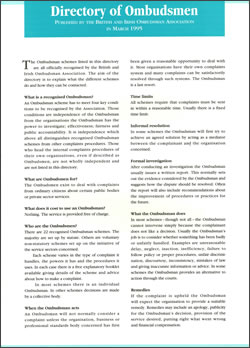 The Directory of Ombudsmen is published in print, with circulation including Citizens Advice Bureaux
The Directory of Ombudsmen is published in print, with circulation including Citizens Advice Bureaux
First BIOA AGM
The Association’s first AGM as BIOA takes place. Decision taken to amend the Association’s Rules so that the Executive Committee always includes one member from the Republic of Ireland. AGM also agrees that there should be a review of the criteria for the use of the term ‘ombudsman’ before consideration is given to applications for voting membership.
Standards of Best Practice
Sub-committee on Standards of Best Practice established to help formulate standards of best practice for an Ombudsman in the performance of their duties.
"Whilst we can take some pride in establishing an Association encompassing 22 member schemes in a relatively short period of time, the more important question is what contribution the Association has made to the work of its members. I believe that the most important contribution has been to help formulate standards of best practice for Ombudsmen in the performance of their duties." Laurence Shurman, founding BIOA Chair, and Banking Ombudsman
Rules and membership criteria
Sub-committee is established to review the rules and membership criteria of the Association.
"The institution of ombudsman is now at an important point in its development in Britain and Ireland. The expectations of the users of ombudsman schemes are high and the Association has a responsibility to help its members meet those expectations." Michael Barnes, BIOA Chair, and Legal Services Ombudsman
"The role of the Association ... is critical. In my view, its existence makes unnecessary any overriding regulator of Ombudsmen such as the Council on Tribunals, as was at one stage mooted. Setting guideline standards of best practice for Ombudsmen, as has recently been done, reinforces the case against having yet another supervisory body. Even more important than its formal role in giving guidance, by bringing members together, the Association helps them to steel each other's resolve to maintain independence and to give access to justice to many that would otherwise be denied it." Laurence Shurman, founding BIOA Chair
Directory of Ombudsmen online
The Directory of Ombudsmen, a list of BIOA members, is made available on the Internet.
A-Z of Ombudsmen
Publication of A-Z of Ombudsmen - ombudsman guide by the National Consumer Council, based on survey of 27 ombudsman offices and associated complaint handlers in England, Scotland, Wales, Northern Ireland and the Republic of Ireland.
Office move
The Association moves its headquarters to the office of the UK Banking Ombudsman.
Guide to Positive Complaints Management
BIOA contributes to the work of the British Standards Institute on preparing a Guide to Positive Complaints Management.
UK Government focal point
Representatives of the Association meet with the Deputy Director of the Machinery of Government and Standards Group at the Cabinet Office, to discuss the Association's proposal that there should be a focal point in UK central government on ombudsman issues. By the end of the year, the Cabinet Office agrees to the proposals. In the future, the ‘focal point’ will be based in the Central Secretariat in the Cabinet Office, working closely with the Lord Chancellor's Department.
Working Groups
Working Groups are established to consider:
- the implications for ombudsman offices of Article 6 of the European Convention on Human Rights and the proposed Freedom of Information legislation, following concerns from some members that the Convention might introduce a juridical note into the extra-juridical area
- how best to raise public awareness of ombudsman schemes; and
- the creation of a BIOA Intranet for exchange of information among ombudsman offices.
Digest of cases
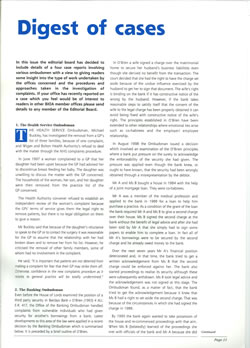 The newsletter features a digest of cases for the first time to give readers some insight into the type of work undertaken by the different offices and the procedures and approaches taken in investigating.
The newsletter features a digest of cases for the first time to give readers some insight into the type of work undertaken by the different offices and the procedures and approaches taken in investigating.
First AGM in Ireland
BIOA’s AGM is held in Ireland for the first time.
UK Human Rights Act
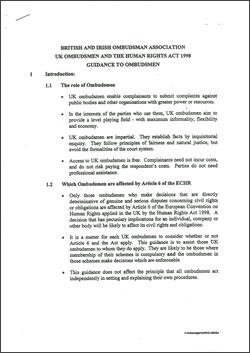 The Association issues guidance to UK ombudsman offices on the Human Rights Act 1998 and the implications of Article 6 of the ECHR.
The Association issues guidance to UK ombudsman offices on the Human Rights Act 1998 and the implications of Article 6 of the ECHR.
Managers’ Group
The Executive asks the Managers' Group to take forward the proposals for developing performance indicators that all ombudsman offices could apply and provide useful information for the public. The Group also considers developing training initiatives which will assist the career development of staff across ombudsman schemes as a whole, allowing them to move and progress within the complaints industry.
Data Protection
 The Association issues guidance to UK ombudsman offices on Data Protection.
The Association issues guidance to UK ombudsman offices on Data Protection.
Geographic scope extended
The geographic scope of the Association is expanded to cover the British Crown Dependencies and Overseas Territories, in addition to the UK and Ireland. Criteria concerning the independence of an ombudsman are adopted.
Future of the Association
Major debates also commence about the future of the Association and whether there would be a benefit in some form of association with other ADR bodies.
Future of the Association
Future of the Association Working Group is established to consider whether there are organisations with similar interests which might wish to join in forming an enlarged Association, without unacceptable consequences for BIOA's current status and objectives, and to report to the Executive Committee on the likely effects on the work, finances and administration of BIOA.
‘It is likely that the use of 'alternative dispute resolution', in all its forms, will increase. I expect this to be accompanied by mounting demands for accreditation and regulation of ADR providers. I also expect that pressure will grow for the production of a coherent statement of how all the various forms of dispute resolution fit together… each of us will have to ensure that the way in which we act is compatible with the requirements of the ECHR. We may think that we are already acting compatibly; but we cannot be sure and we have to be eagle-eyed in watching the development of case law ... these, and other changes, will not only affect members’ day-to-day work; they may also have a profound effect on BIOA. I believe, therefore, that it is timely that the Association has set up the working group to consider the future of BIOA'.
Edward Osmotherly, BIOA Chair, and Local Government Ombudsman for England
Legal Liaison Working Group
Legal Liaison Working Group is established to recommend how best to raise awareness and understanding of ombudsman schemes among legal service practitioners, legal professional bodies, the judiciary and other key players in the development and regulation of legal services.
Joint work
Decision is made at AGM that 'no changes should be made in the Association’s status and activities'. However, it is decided that a new working group should be established to take forward joint work among the members. It is also decided that other eligible organisations should be invited to apply for Corporate Associate membership.
First seminar
First seminar organised by the BIOA Managers’ Group takes place. The participants discuss, among other things, predicting volumes of work; ADR; data protection and freedom of information.
Website launched
Re-designed BIOA website launched. In addition to the directory of ombudsman offices and other complaint-handling bodies it now includes the Association's rules; the criteria for recognition of ombudsman offices; a 'useful resources' section include current and recent issues of the Ombudsman newsletter; and a bibliography about ombudsman and other ADR services.
Review of the Association
Executive Committee agrees to review the future of the Association. This decision is prompted by the level of subscription now required of members; the changing nature of some ombudsman schemes leading to fewer but larger schemes; and the wider spectrum of membership. The planned review will consider what the core activities of the Association should be, what income and resources are needed to run it; and the appropriate level of subscription.
Guidance on setting up an ombudsman
The Association agrees a joint guidance note for UK Government departments with the Lord Chancellor's Department and the Cabinet Office on setting up an ombudsman scheme. The note is published on the Cabinet Office and BIOA websites.
Legal Interest Group established
Legal Interest Group is established, bringing together legal advisers and others with similar responsibilities.
Communications Interest Group established
Communications Interest Group is established as the Association steps up its efforts to raise awareness of ombudsman and their activities:
 Web pages developed for young people and launched under the heading 'Information for Schools' to coincide with the inclusion of citizenship as part of the National Curriculum.
Web pages developed for young people and launched under the heading 'Information for Schools' to coincide with the inclusion of citizenship as part of the National Curriculum.
Promotional activities target libraries and law departments and colleges. Posters drawing attention to the services offered by members of the Association and directing people to the BIOA website are circulated to all libraries in England, Scotland, Wales and Northern Ireland, with a Welsh language version also distributed in Wales. Promotional posters are also distributed to over 180 law departments and colleges in the UK and Ireland.
Colcutt Review
The Executive Committee meets with the UK Cabinet Office regarding the proposed merger of the public sector ombudsman schemes in England, as proposed in the ‘Colcutt Review’. The Committee is told that 'the principles of the Colcutt review had been accepted but a number of issues remained unresolved’.
Review of Association
Decision is taken at the AGM that no changes should be made in the role and functions of the Association, or to the categories of membership.
‘Following the consultation last year on the Future of the BIOA, it was clear that .... there should be no fundamental change in our organizational structure. But the time has come to move on to a different topic, that is the extent to which the organization should be seen as a private or public body...Our concordat with the UK Cabinet Office and the Department of Constitutional Affairs gives us some official recognition. But there is bound to be a limit to the co-operation or influence a private club can expect to claim with government. We assert the right to be consulted when the [UK] government is planning new ombudsman schemes, and we claim that our criteria (judged privately by us) should be applied publicly. But this claim to recognition is at odds with our status. While we behave like a private club, that is the way we can expect to be treated’.
Walter Merricks, BIOA Chair, and Financial Ombudsman Service
Training and Development Interest Group established
The Training and Development Interest Group (later known as the HR Interest Group) meets for the first time. The participants discuss, among other things, how to improve communication on training among members, sharing of training strategies, and accreditation for management training.
“I believe I speak for all the founder members in saying that when BIOA (originally the UK Ombudsman Association) was formed…our overriding concern both then and subsequently was the public interest".
Laurence Shurman, founding Chair
First Annual Report published
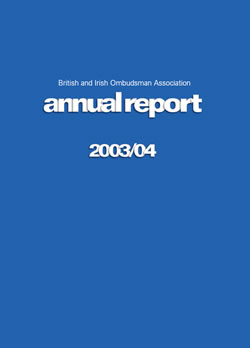 The first annual report of the Association (2003/04) is published.
The first annual report of the Association (2003/04) is published.
“The past year has seen unprecedented attention to ombudsman services in the public and private sectors, both in the UK and Ireland, setting the Association an exceptional agenda of internal and external activity. ... This year we have been put to the test on all fronts ... the concordat that BIOA has with the UK Cabinet Office calls for prior consultation on plans for schemes of this kind, which unfortunately did not happen. Progress on modernising the public sector ombudsman legislation has been disappointingly slow...We are left wondering whether anyone will ever coordinate policy on ombudsman services. By the same token no doubt, individual ministers may be asking what is this association of ombudsmen that asserts the right to query their policies.”
Walter Merricks, BIOA Chair, and Financial Ombudsman Service
Future direction of the Association
At the Annual Meeting in May 2004 major debates take place about the future direction of the Association:
- It is decided that the name 'British and Irish Ombudsman Association' should be retained and there is a broad agreement that the Association’s behaviour should be brought into line with that of a public body, ‘moving from the style of a private members’ club to that of a self-regulating publicly accountable institution’. This is to be achieved through changing of the status of the Annual Meeting, publication of the Annual Report and improving the reach of The Ombudsman newsletter. A decision is taken to discontinue the category of Ordinary Member and encourage staff of ombudsman and complaint-handling offices to participate in the work of the Association without the need to take out personal membership.
- A major survey of the members is undertaken. The development priorities include, among others, better public promotion of the concept and value of ombudsman; a clearer articulation of the Association's role and purpose; a statement of principles on good practice in complaint-handling; strengthening the BIOA's role with governments and the public; and creating a sense of 'profession' amongst staff.
The Ombudsman goes colour
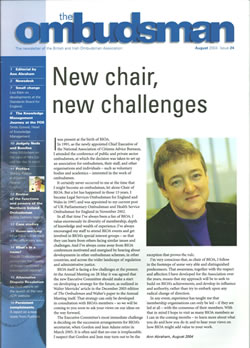 First colour edition of The Ombudsman newsletter is issued.
First colour edition of The Ombudsman newsletter is issued.
Data Protection Guidance
The Association and the Office of the UK Information Commissioner publish a joint Data Protection Guidance Notice, to assist BIOA members in the UK to comply with their obligations under the Data Protection Act 1998.
Increased stakeholder engagement
BIOA undertakes a wide range of influencing activities: contributing to the UK Government White Paper 'Transforming Public Services: Complaints, Redress and Tribunals'; engaging with the National Audit office on their draft report 'Citizen Redress: what citizens can do if things go wrong with public services', and submitting evidence on the draft legislation to establish the Welsh Public Services Ombudsman and the Scottish Consumer Council’s review of the civil justice system in Scotland.
Gordon Adams retires
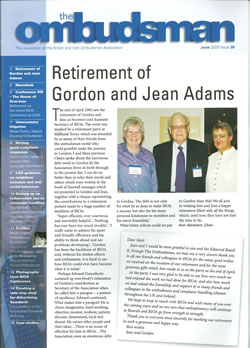 Gordon and Jean Adams retire as Secretary and Assistant Secretary of BIOA after 12 years and are succeeded by Ian Pattison as Secretary and Shirley Browne as part-time administrator. “Gordan has been the backbone of BIOA and, without his tireless efforts and enthusiasm, it is hard to see how BIOA could ever have become what it is today.”
Gordon and Jean Adams retire as Secretary and Assistant Secretary of BIOA after 12 years and are succeeded by Ian Pattison as Secretary and Shirley Browne as part-time administrator. “Gordan has been the backbone of BIOA and, without his tireless efforts and enthusiasm, it is hard to see how BIOA could ever have become what it is today.”
Website outsourced
Responsibility for the management of BIOA’s website is transferred from the UK Financial Ombudsman Service to a commercial firm.
Principles of Good Complaint Handling
Working Group established to develop Principles of Good Complaint Handling, that would be applicable to all BIOA members and act as a model for the outside world.
Guidance to setting up an ombudsman
Following a meeting with UK Government representatives from the Cabinet Office, the Department of Constitutional Affairs, and, for the first time, the Department of Trade and Industry, it is agreed that the guidance to government departments about setting up ombudsman schemes, and the importance of consulting BIOA when doing so, would be revised.
Mapping the landscape
The Association engages with the Council on Tribunals (CoT) to jointly manage an exercise to map the ombudsman and complaint-handling landscape, as part of a wider ongoing exercise to map the entire administrative justice landscape.
"The Association continues to attract new members…It is gratifying to know that many new schemes are set up with BIOA membership in mind and that the BIOA criteria for Voting Membership continue to be recognised as a benchmark for genuinely independent complaint-handling schemes."
Ann Abraham, BIOA Chair, and Parliamentary & Health Service Ombudsman
Principles of Good Governance
Working Group is established to examine issues relating to the leadership, direction and control of an ombudsman scheme and draft Principles of Good Governance.
Website revised
Revised website is launched, with features including a search facility; a job vacancies section; and a content management system.
"BIOA is in very good health and welcomes the influx of new members. However, key to this growth is the continued application of rigorous standards in determining whether the scheme meets the exacting requirements of the Association. The term ‘proliferation’ has, unfortunately, been attached to the creation of more ombudsman schemes but our determination is certainly not to grow indiscriminately but to welcome every member who can show that the scheme demonstrates integrity, independence, and discipline, vital to our continued success."
Tony Redmond, BIOA Chair, and Local Government Ombudsman for England
Principles of Good Complaint Handling published
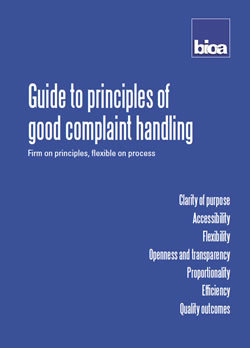 The Association publishes 'Guide to principles of good complaint handling: Firm on principles, flexible on process’, “The guide seeks to distil the experience and expertise of BIOA membership … [it] is not meant to be prescriptive or all-encompassing, as schemes vary in size and remit and there is no ‘one size fits all’ model.” The Working Group also produces an assessment toolkit ‘Spotlight’, intended as an aid for schemes to assess their own complaint-handling performance.
The Association publishes 'Guide to principles of good complaint handling: Firm on principles, flexible on process’, “The guide seeks to distil the experience and expertise of BIOA membership … [it] is not meant to be prescriptive or all-encompassing, as schemes vary in size and remit and there is no ‘one size fits all’ model.” The Working Group also produces an assessment toolkit ‘Spotlight’, intended as an aid for schemes to assess their own complaint-handling performance.
Accreditation Working Group established
Accreditation Working Group is established, to consider an appropriate scheme for accreditation of staff and identify potential providers. In parallel, the Scottish Public Services Ombudsman and Queen Margaret University in Edinburgh are working together to develop an accredited training programme in complaint handling 'Managing Customer Complaints' with the intention of making it widely available to BIOA members and to ombudsman offices from other countries.
Website enhanced
‘Members Area’ is added to the website.
First Contact Interest Group established
First Contact Interest Group is established as a forum for sharing best practice, initiatives and ideas on delivering ‘gateway’ services to filter inquiries and complaints.
AJTC established
The Council on Tribunals is abolished and the Administrative Justice and Tribunals Council is established in the UK to oversee the entire administrative justice landscape, including ombudsman schemes.
Criteria recognised as best practice
Bridget Prentice MP, the UK Government Minister with responsibility for the Legal Services Act, acknowledges the authority of BIOA in setting the criteria for the establishment of new ombudsman schemes:
"An effective (and BIOA compliant) ombudsman scheme can be the hallmark of consumer protection. It is important therefore, that the OLC, in establishing the new ombudsman scheme, will be under a duty to have regard to the principles of best practice in the administration of ombudsman schemes .... In accordance with this, the establishment and administration of the new ombudsman scheme should be guided by BIOA's values of clarity of purpose, accessibility, flexibility, openness and transparency, proportionality, efficiency, and the strive for quality outcomes. The content of these reforms is the result of working closely with consumer organizations and BIOA members .... It is important that these valuable relationships should continue and strengthen throughout and beyond implementation".
First Irish Chair of the Association
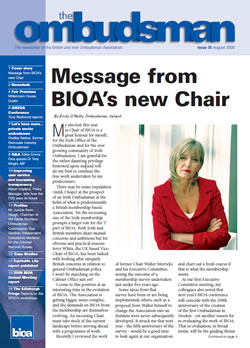 Emily O’Reilly becomes the first Irish member to chair the Association: “…the increasing size of the Irish membership prompts a larger role for the ‘I’ part of BIOA. Both Irish and British members share mutual concerns and ambitions…The Association is getting bigger, more complex, and the demands on BIOA from the membership are themselves evolving.”
Emily O’Reilly becomes the first Irish member to chair the Association: “…the increasing size of the Irish membership prompts a larger role for the ‘I’ part of BIOA. Both Irish and British members share mutual concerns and ambitions…The Association is getting bigger, more complex, and the demands on BIOA from the membership are themselves evolving.”
Future Direction review
The Executive Committee decides to carry out a ‘Future Direction’ review to consider the role and activities of the Association. It is agreed that it should, in due course, include a review of the Association’s rules and criteria for membership. After an open competition, Carolyn Hirst (with Professor Janette Webb) is appointed to carry out the initial work.
Future Direction review
Future Direction consultation and review undertaken.
Guide to principles of good governance published
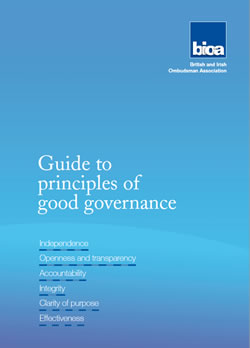 The Association publishes ‘Guide to principles of good governance’, deriving from the work of the Governance Working Group. The guide identified six high-level principles, intended to supplement BIOA’s Criteria for the recognition of Ombudsman offices, while at the same time recognising the diversity of BIOA membership: Independence; Openness and transparency; Accountability; Integrity; Clarity of purpose; and Effectiveness.
The Association publishes ‘Guide to principles of good governance’, deriving from the work of the Governance Working Group. The guide identified six high-level principles, intended to supplement BIOA’s Criteria for the recognition of Ombudsman offices, while at the same time recognising the diversity of BIOA membership: Independence; Openness and transparency; Accountability; Integrity; Clarity of purpose; and Effectiveness.
Guidance on setting up an ombudsman updated
UK Cabinet Office publishes updated Guidance for government departments on setting up Ombudsman schemes. “An effective (and British and Irish Ombudsman Association (BIOA) compliant) Ombudsman scheme can be the hallmark of fair redress. It is important therefore that anyone establishing such a scheme should consult with the Cabinet Office which acts as the Government liaison point on Ombudsman matters, and also provides the channel of communication with BIOA.”
Change to membership and governance
Following the Future Direction Review, decision taken at AGM to maintain two categories of membership, with ‘Voting members’ renamed ‘Members’ and ‘Associate’ renamed ‘Associate Member’. The composition of the Executive Committee was also expanded to provide permanent representation from the larger ombudsman schemes, from the devolved nations, two from the Republic of Ireland and two associate members
First Chair from UK’s devolved nations
Peter Tyndall, the Public Services Ombudsman for Wales, becomes the first member from one of the UK’s devolved countries to chair the Association.
New Interest Group established
Research Interest Group is established, bringing together those with an interest in research amongst members.
Accreditation Working Group
The Accreditation Working Group completes its task of developing training for case handlers of BIOA member schemes with approval of two training suppliers: Queen Margaret University (QMU), Edinburgh and Bond Solon, with the first courses run in July 2011.
Irish members group
First meeting of ‘Members from Ireland’ is held, supported by the BIOA Chair and Secretary, to encourage greater cooperation and coordination between Irish members.
Change to membership categories
Following the Review of Criteria and Rules of the Association undertaken by the Validation Committee, which included a substantial consultation with members, it is agreed at the AGM that three categories of membership be adopted: Ombudsman Members, Complaint Handler members; and Associate Members (Corporate and Individual). Other changes include redrafting of the Criteria for Ombudsmen Members, with the additional of ‘Openness and transparency’, and a reference to the adherence by Members to the BIOA Guides. Requirements for Complaint Handler membership are adopted and strengthening of the Association’s position on the use of the title ‘Ombudsman’ and position on proliferation.
“We need to be supporting the extension of access to those currently excluded, while resisting the proliferation of schemes which would cause confusion for users and lead to lower standards”.
Peter Tyndall, BIOA Chair, and Public Services Ombudsman for Wales
Private Sector Ombudsmen Group set up
First meeting of the new Private Sector Ombudsmen Group to discuss issues of mutual interest.
Name changed to ‘Ombudsman Association’
BIOA changes public name to ‘Ombudsman Association’, with the strap line ‘Promoting independent complaint resolution’, both to develop a new brand and to ensure greater acceptance in all the nations and territories in which members operate.
“It is a clean and modern image for the Association, the new name is much easier to understand, and with the strap-line, makes it clearer what the Ombudsman Association is here to do.”
Peter Tyndall, BIOA Chair, and Public Services Ombudsman for Wales
Contribution to Leveson Inquiry
The Association makes written submission to the Leveson Inquiry into the Press, followed by participation in oral evidence session, and a meeting with Lord Hunt, Chairman of the Press Complaints Commission, (in August) about the desirability of separating regulation and redress: “one of the most encouraging developments of the year was an invitation to make submissions to Lord Leveson’s Inquiry into the Culture, Practice and Ethics of the Press, initially in writing and then by appearance as a witness....The evidence to the Leveson Inquiry was probably the most high profile contribution to public policy that the Association has ever been asked to make'”.
Tony King, OA Chair, and Pensions Ombudsman
AJTC sucessor
Following the abolition of the Administrative Justice and Tribunals Council (AJTC), the Association is represented on a new body set up by the UK Ministry of Justice, the Administrative Justice Advisory Group.
Website re-launched
The Association website is re-written, updated, and re-launched. The revamped version features four main sections: a search facility for members of the public to look for a suitable ombudsman or complaint handler; detailed description of ombudsman schemes, what they do and what areas they cover; details of the Association, its members, publications and activities; and a resource area for Association members and staff of member schemes.
Final issue of The Ombudsman
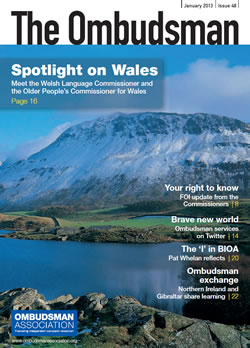 Issue 48 (January 2013) is the final printed edition of the Association newsletter, following the decision for it to be discontinued on cost grounds and replaced with an electronic version.
Issue 48 (January 2013) is the final printed edition of the Association newsletter, following the decision for it to be discontinued on cost grounds and replaced with an electronic version.
Online blog launched
 The first, and as it transpires last, electronic version of the newsletter, Issue 49. After that issue, it is decided to discontinue the formal periodic newsletter in favour of a continuous blog of news, articles and features.
The first, and as it transpires last, electronic version of the newsletter, Issue 49. After that issue, it is decided to discontinue the formal periodic newsletter in favour of a continuous blog of news, articles and features.
Strategic Position Statement adopted
The Association adopts the Strategic Position Statement on Ombudsman which set down core policies for the Association: ‘Its adoption was at one and the same time a small step and a giant leap. The statement contained nothing surprising or controversial, but it was the first time in 20 years of existence that the Association had taken a position that, though it might not be shared by every member in every detail, represented common ground between us generally’. The document focuses specifically on the strategic policies that guide the Executive Committee of the Ombudsman Association in responding to consultations; dealing with governments, the European Commission and other policy-makers; and issuing public communications.
'I am sure that many of us have found managing our own organisations’ affairs pretty challenging in the last few years. In those circumstances there is at least the risk that each of us will, through necessity, become more inclined to focus on our own organisation’s interests, and less inclined to look towards the Association and join up our thinking.'
Tony King, OA Chair, and Pensions Ombudsman
Strategic Review of Association launched
A Strategic Review of the Association is launched. Ipsos MORI is commissioned to research what members think of the Association, the services it provides and their expectations, needs and requirements of it.
Irish Ombudsman Forum
The inaugural meeting of the re-launched Irish Ombudsman Forum is held.
New Interest Group established
Equality, Diversity and Human Rights Interest Group is established.
Strategic Review of the Association
Strategic Review of the Association identifies the need for it to be more proactive in communication with members; improve relationships with governments and decision makers; play a stronger advocacy role; offer more training specific to ombudsman and complaint handlers; and provide more guidance, best practice and case-studies. The Executive takes forward further reviews on how to implement the proposed changes, including a further consultation with members.
Ian Pattison retires
Ian Pattison retires as Association Secretary. Donal Galligan appointed Interim Secretary whilst the Strategic Review is still underway.
First Policy Network Seminar
Policy Network Seminar on the topic of the Alternative Dispute Resolution Directive and the Online Dispute Resolution Regulations is held at the offices of the UK Financial Ombudsman Service. This is the first seminar for the newly formed Policy Network, established to provide a forum for all members to share horizon scanning, develop initiatives, and to harness the existing expertise of members to develop joint Association positions.
Protection of ‘Ombudsman’ strengthened
The Association achieves a significant success in its long-held aim to safeguard the role and title of ‘ombudsman’ after Companies House add to their criteria that a business must meet the Ombudsman Association’s membership criteria to be able to register a company in the UK with the title ‘ombudsman’, or trade as such.
"This recognition of the Association’s membership criteria as the ‘gold standard’ is something we should be justifiably proud of’"
Lewis Shand Smith, OA Chair, and Ombudsman Services
Service Standards Framework Group
An embryonic Service Standards Framework Group meets for the first time to start the work of developing a generic standards framework that could be used by all members.
Changes stemming from Strategic Review approved
Proposals to implement the Strategic Review are approved, including changes to the size and composition of the Executive and governance of the Association to ensure greater engagement from members, the adoption of a ‘Vision’ statement, a revision of the Objects, and the decision to increase membership fees and appoint a Director to increase services. Following the consultation with members the proposal to adopt ‘universal’ membership is not taken forward.
Gender neutrality of ‘ombudsman’ recognised
The Association submits evidence to the Northern Ireland Assembly Committee to clarify the gender-neutral origin of the Swedish word ‘ombudsman’, in relation to the proposals to create a Northern Ireland Public Services Ombudsperson / Ombudsman.
First Director appointed
Following the completion of the Strategic Review, Donal Galligan is appointed as the first Director of the Ombudsman Association.
First Business Plan published
The Association publishes its first Business Plan, for 2016/17.
MoU signed with IOI
 The Association signs Memorandum of Understanding with the International Ombudsman Institute. The MoU commits both organisations to establish a cooperative relationship to share best practice in complaint handling and redress, and the protection and promotion of human rights and consumer rights.
The Association signs Memorandum of Understanding with the International Ombudsman Institute. The MoU commits both organisations to establish a cooperative relationship to share best practice in complaint handling and redress, and the protection and promotion of human rights and consumer rights.
Equality and diversity issues mainstreamed
The work of the Equality, Diversity and Human Rights Interest Group is mainstreamed into that of the other Interest Groups, to ensure that equality, diversity and human rights issues are reflected in the day-to-day activities of all staff.
Position on non-proliferation strengthened
Following a review, the Executive issues revised guidance to the Validation Committee in respect of applications for membership of the Association, and re-validation of existing schemes, particularly in the context of the Association’s principle of non-proliferation.
Casework Interest Group established
Casework Interest Group is established to focus on improving the casework of members in order to improve the service provided to service users.
Overseas Members Network
An Overseas Members Network is set up to support members in the Overseas Territories.
First edition of online newsletter
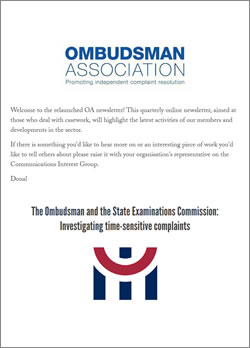 The relaunched quarterly online newsletter is published for the first time, aimed at those who deal with casework, highlighting the latest activities of the Association’s members and developments in the sector.
The relaunched quarterly online newsletter is published for the first time, aimed at those who deal with casework, highlighting the latest activities of the Association’s members and developments in the sector.
Joint Committee on Public Petitions
Following representations made by the Irish Ombudsman Forum, the Oireachtas changes the remit of the Joint Committee on Public Petitions to consider the report of an ombudsman if the relevant subject committee refuses to.
Service Standards Framework published
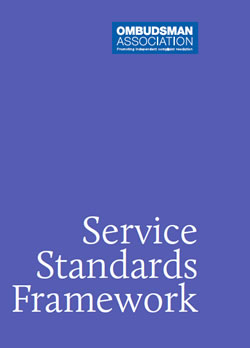 The Association publishes its Service Standards Framework following a public consultation. "The development of a generic Service Standards Framework was the flagship project for the Association this year. Having external stakeholders on the steering group and undertaking a public consultation has resulted in a robust framework that members can use to raise their own performance, embed good practice in their organisation, and to demonstrate the quality of the service they provide"
The Association publishes its Service Standards Framework following a public consultation. "The development of a generic Service Standards Framework was the flagship project for the Association this year. Having external stakeholders on the steering group and undertaking a public consultation has resulted in a robust framework that members can use to raise their own performance, embed good practice in their organisation, and to demonstrate the quality of the service they provide"
Kieran FitzGerald, OA Chair, and Garda Síochána Ombudsman Commission
Strategic Position Statement revised
Following a review by the Policy Network in spring 2017, the Association adopts a revised version of the Strategic Position Statement.
Caseworker Competency Framework
Caseworker Competency Framework project launched to develop a generic Framework for members.
Service Standards Framework
Service Standards Framework Working Group established to share best practice in assessing and reporting against the Framework.
25th anniversary of the establishment of the Association
“One of my predecessors as Chair recently pointed out that whilst the Association’s current objects perhaps reflect a bolder and more ambitiously articulated agenda - supporting and promoting an effective system of complaint handling and redress and providing an authoritative voice - she suspected the founder members of 1993 would have no difficulty in recognising and relating to the Association of 2018. I couldn’t agree more.”
Nick Bennett, OA Chair, and Public Services Ombudsman for Wales
Chairs of the Association
- Laurence Shurman Banking Ombudsman: 1993 - 1996
- Michael Barnes Legal Services Ombudsman: 1996 - 1999
- Edward Osmotherly Local Government Ombudsman for England: 1999 - 2001
- Walter Merricks Financial Ombudsman Service: 2001 - 2004
- Ann Abraham UK Parliamentary and Health Service Ombudsman: 2004 - 2006
- Tony Redmond Local Government Ombudsman for England: 2006 - 2008
- Emily O’Reilly Ombudsman and Information Commissioner for Ireland: 2008 - 2010
- Peter Tyndall Public Services Ombudsman for Wales: 2010 - 2012
- Tony King Pensions Ombudsman (UK): 2012 - 2014
- Lewis Shand Smith Ombudsman Services: 2014 - 2016
- Kieran FitzGerald Garda Síochána Ombudsman Commission: 2016 - 2017
- Nick Bennett Public Services Ombudsman for Wales: 2017 - 2019
Secretary / Director
- Gordon Adams 1993-2005
- Ian Pattison 2005-2014
- Donal Galligan (Interim) 2014-2016
- Donal Galligan appointed first Director of OA in February 2016